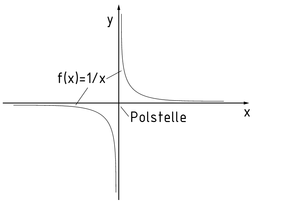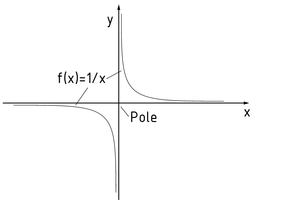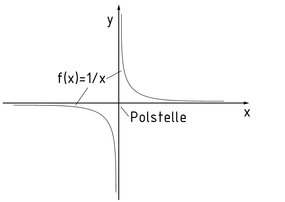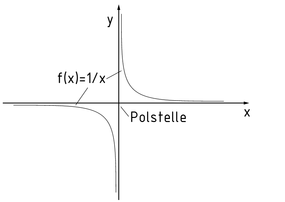
Wählen Sie eine
oder mehrere Sprachen aus
0,1,0
- Deutsch
- Englisch
- Chinesisch
- Spanisch
Polstelle

An der Polstelle einer Funktion liegt eine Definitionslücke vor. Die Funktion hat dort eine senkrechte Asymptote. Die Funktionswerte streben an der Polstelle gegen plus bzw. minus Unendlich. Mit dem Grad der Funktion wächst die Steigung der Funktion im Bereich der Polstelle.
Es werden Polstellen mit bzw. ohne Vorzeichenwechsel unterschieden. Ist die Potenz der Funktion gerade, so liegt kein Vorzeichenwechsel vor. Bei ungerader Potenz erfolgt ein Vorzeichenwechsel und das Streben der Funktion sowohl gegen plus als auch minus Unendlich.
Pole

There is a discontinuity at the pole of a function where the function has a vertical Asymptote. The values of the function at the pole tend towards plus or minus infinity. The function's gradient in the vicinity of the pole increases along with the order of the function.
A distinction is made between poles with and without a change of +/- sign. There is no change of sign in the case of even-Power functions. In the case of odd powers, the sign changes and the function tends towards both plus and minus infinity.
极点

函数在极点处存在不连续点,即函数在该点处存在垂直渐近线。在极点处函数值趋向于正无穷或负无穷。在极点附近的邻域,函数的切线斜率随着函数的阶数增加而增大。
极点分为带有正负号的极点和不带正负号的极点:偶次幂函数中没有符号的变化。 在奇次幂函数中伴有符号的变化,且函数值趋向正负无穷两端。
带有正负符号变化的极点
近义词
极点(数学)
Polo

Existe una discontinuidad en el polo de una función cuando la función cuenta con una asíntota vertical. Los valores de la función en el polo tienden hacia más o menos infinito. El gradiente de la función en las proximidades del polo se incrementa junto con el orden de la función
Se diferencia entre los polos con o sin un cambio de signo +/-. No hay cambio de signo en el caso de las funciones con potencia par. En caso de las potencias impar, el signo cambia y la función tiende tanto a más como a menos infinito.
Polo con cambio de signo +/-
